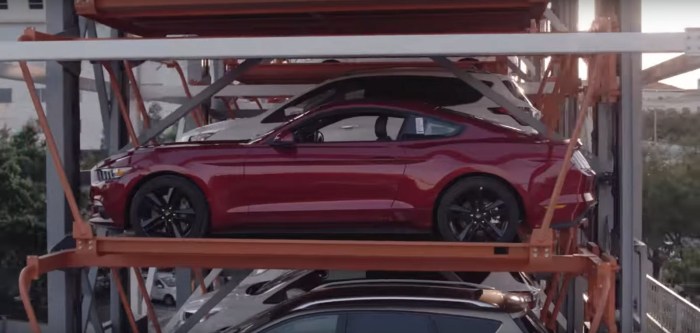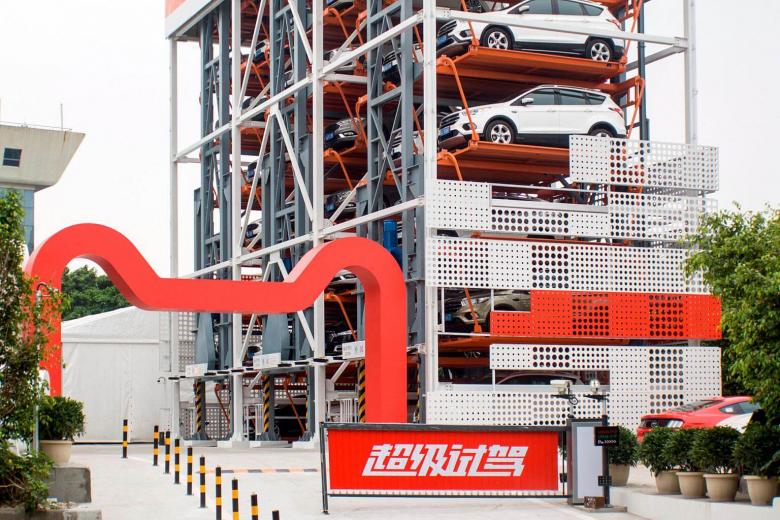Ford car vending machine Alibaba: Imagine strolling into a sleek, automated showroom, swiping your card, and driving away in your brand-new Ford. Sounds futuristic, right? But this isn’t science fiction; it’s the potential reality of a partnership between Ford and Alibaba, leveraging the giant e-commerce platform’s reach and technological prowess to revolutionize car buying. This exploration delves into the exciting possibilities and challenges of this innovative approach to car sales, from supply chain logistics to consumer perception and the integration of cutting-edge technology.
This isn’t just about vending machines; it’s about reshaping the automotive industry. We’ll dissect Alibaba’s role in this new ecosystem, from supplying parts to powering the entire operation via its cloud services. We’ll examine consumer acceptance, address logistical hurdles, and even peek into the future of AI-powered, blockchain-secured automated car dispensaries. Get ready for a ride into the future of car buying!
Ford Car Vending Machines

Source: carscoops.com
Remember those viral Ford car vending machines on Alibaba? The whole “buy-a-car-like-a-snack” thing felt revolutionary, a bit like how Microsoft shaking up its E3 2018 presence microsoft shakes up e3 2018 presence significantly felt back then – a disruptive shift in the gaming world. Ultimately, both events highlight the power of unexpected approaches to established markets, making you wonder what other crazy retail innovations Alibaba will dream up next.
The rise of the automated car dispensary, a concept once relegated to science fiction, is rapidly reshaping the automotive retail landscape. While Ford’s involvement might be limited, the global market for these innovative vending machines is booming, promising a faster, more convenient, and potentially more cost-effective way to buy a car. This exploration delves into the current state of this evolving sector.
Global Market Landscape for Automated Car Dispensaries
The global adoption of automated car dispensaries is uneven, with certain regions showing significantly higher uptake than others. Currently, North America, particularly the United States, and parts of Europe, including Germany and the UK, are leading the charge. These regions boast a higher concentration of affluent consumers comfortable with digital transactions and self-service models, along with existing infrastructure conducive to such ventures. Asia, specifically in countries like China and Japan, is also witnessing increasing interest, albeit at a slower pace, largely due to factors like land availability and regulatory hurdles. However, the overall global market is experiencing exponential growth, fueled by technological advancements and changing consumer preferences.
Comparison of Automated Car Dispensary Models
Several models of automated car dispensaries exist internationally, each with its own unique features and capabilities. Some are fully automated, requiring minimal human intervention, while others incorporate a hybrid approach, integrating human assistance for certain processes like final paperwork or vehicle customization. Variations also exist in terms of size and capacity, ranging from smaller units dispensing a limited number of vehicles to larger, multi-story structures capable of accommodating a wider selection. Technological differences include the level of automation in the retrieval system, security features, and integration with digital payment platforms. For instance, some systems use advanced robotics for precise vehicle handling, while others rely on simpler mechanical systems.
Technological Advancements in Automated Car Dispensaries
The development of more sophisticated automated car dispensaries is driven by continuous technological advancements in several key areas. Robotics and automation are at the forefront, enabling smoother, faster, and more precise vehicle handling. Artificial intelligence (AI) plays a crucial role in optimizing inventory management, enhancing security measures, and providing personalized customer experiences through intelligent interfaces. Advancements in sensor technology and machine learning algorithms allow for more efficient vehicle retrieval and improved safety protocols. The integration of blockchain technology is also emerging as a potential solution for enhancing transparency and security in transactions. For example, AI-powered systems can analyze customer preferences to recommend suitable vehicles and streamline the purchasing process.
Cost-Effectiveness of Automated Car Dispensaries vs. Traditional Dealerships
The cost-effectiveness of automated car dispensaries compared to traditional dealerships is a complex issue, depending on various factors including location, scale of operation, and vehicle inventory. However, a general comparison can be made:
| Model | Location | Cost | Advantages |
|---|---|---|---|
| Fully Automated Dispensary (Large) | Urban Area, High-Traffic Location | High Initial Investment, Lower Operational Costs | 24/7 Availability, Reduced Labor Costs, Enhanced Customer Experience |
| Hybrid Dispensary (Medium) | Suburban Area, Moderate Traffic | Moderate Initial Investment, Moderate Operational Costs | Balanced Approach, Combines Automation with Human Assistance |
| Traditional Dealership | Various Locations | High Operational Costs, Lower Initial Investment (Depending on existing infrastructure) | Personalized Service, Wider Range of Services (e.g., financing, repairs) |
Alibaba’s Role in the Ford Car Vending Machine Ecosystem
Alibaba’s vast network and infrastructure could significantly impact the success of Ford’s car vending machine initiative, extending far beyond simply providing a platform for sales. Its involvement spans the entire lifecycle of the project, from sourcing components to facilitating post-sale services. This symbiotic relationship leverages Alibaba’s strengths to bolster Ford’s innovative approach to car distribution.
Alibaba’s potential contributions are multifaceted and deeply integrated into the overall operation. Consider its influence on the supply chain, its e-commerce prowess, and the potential application of its cloud services – all crucial elements in making this ambitious venture a reality.
Alibaba’s Role in the Ford Car Vending Machine Supply Chain
Alibaba’s B2B marketplace offers access to a vast network of suppliers for various components needed in constructing the vending machines themselves. Everything from the sophisticated robotics and automated systems to the structural materials and security features could be sourced through Alibaba’s platform, streamlining procurement and potentially lowering costs for Ford. This efficiency translates to faster deployment and potentially lower overall project costs. For example, Ford could source high-quality steel from Chinese manufacturers, specialized sensors from Taiwanese companies, and robotic arms from suppliers in Japan – all facilitated through Alibaba’s efficient platform. The transparency and competitive pricing offered by the platform would be particularly beneficial in managing the complexities of a global supply chain.
Alibaba’s E-commerce Platform Facilitating Vehicle Sales
Alibaba’s e-commerce expertise could be leveraged to create a seamless online-to-offline (O2O) experience for customers. The platform could host virtual showrooms, allowing customers to browse vehicle options, configure their chosen car, and complete the purchase entirely online. The online platform would then integrate with the vending machine system, allowing customers to schedule a pickup time and receive a unique code to retrieve their vehicle. This integration creates a frictionless purchasing process, blurring the lines between online browsing and physical delivery, mirroring successful O2O models already employed by other industries. Imagine a scenario where a customer orders a Ford Bronco online through Alibaba, customizes it to their specifications, and then receives a code to retrieve their new SUV from a vending machine near their home.
Alibaba Cloud Services for Operation and Maintenance
Alibaba Cloud, a leading provider of cloud computing services, offers a suite of solutions ideal for managing the complex operations of a network of car vending machines. Remote monitoring, predictive maintenance, and data analytics capabilities provided by Alibaba Cloud would allow Ford to optimize the performance of its vending machines, minimize downtime, and proactively address potential issues. This includes real-time monitoring of machine status, automated alerts for maintenance needs, and the ability to remotely diagnose and resolve problems. This proactive approach minimizes operational disruptions and ensures a smooth customer experience. Data collected from the vending machines could also be analyzed to optimize inventory management, predict demand, and refine operational strategies.
A Hypothetical Alibaba-Ford Business Model for Automated Car Sales
A potential business model could involve a revenue-sharing agreement between Ford and Alibaba. Ford would provide the vehicles and manage the physical vending machine infrastructure, while Alibaba would handle the online sales platform, digital marketing, and cloud-based operational management. Alibaba would receive a commission on each vehicle sold through its platform, while Ford would benefit from Alibaba’s extensive reach and technological expertise. This model would leverage the strengths of both companies, creating a powerful synergy that could revolutionize the car buying experience. This collaborative approach could also expand to include other services, such as financing options, insurance integration, and post-sale support, all managed through the Alibaba ecosystem. The success of this model would depend on a seamless integration of online and offline processes, creating a customer-centric experience that is both convenient and efficient.
Consumer Perception and Market Acceptance

Source: com.sg
The idea of buying a car from a vending machine – a giant, automated car dispenser – sounds like something out of a futuristic movie. But for Ford, in partnership with Alibaba, this is becoming a reality. However, the success of this innovative approach hinges entirely on consumer perception and market acceptance. Will people embrace this new way of car shopping, or will they stick to the traditional dealership experience? The answer lies in understanding both the potential benefits and drawbacks from a consumer’s point of view, and crafting a marketing strategy that addresses any concerns.
Consumer attitudes towards purchasing vehicles from automated dispensaries are complex and multifaceted. While the novelty factor is undeniable, many consumers harbor reservations about such a drastic departure from established norms. The lack of personalized interaction with sales staff, the inability to thoroughly inspect the vehicle before purchase, and concerns about potential technical malfunctions are all significant barriers to adoption. Conversely, the potential for increased convenience, 24/7 accessibility, and potentially lower prices could prove alluring to a significant segment of the population, particularly younger, tech-savvy buyers.
Consumer Benefits and Drawbacks of Automated Car Dispensaries
The allure of a streamlined, efficient car-buying process is undeniable. Imagine browsing online, selecting your vehicle, and picking it up at your convenience, day or night, without the pressure of a salesperson. This convenience factor alone could be a powerful driver of adoption. However, the lack of human interaction represents a significant drawback for many. The personalized service and expert advice offered by traditional dealerships are valued by a substantial portion of car buyers. Further, the inability to test drive the vehicle before purchase, to have questions answered immediately by a knowledgeable expert, or to negotiate the price, could be deal-breakers for others. Ultimately, the balance between convenience and personalized service will determine the level of consumer acceptance.
Marketing Campaign to Overcome Consumer Apprehension
A successful marketing campaign needs to address head-on the concerns consumers have about buying a car from a vending machine. This requires a multi-pronged approach focusing on transparency, trust, and ease of use. The campaign should highlight the benefits of speed and convenience, emphasizing the user-friendly interface of the online ordering system and the automated dispensing process itself. Crucially, it needs to alleviate concerns about vehicle quality and safety by showcasing robust quality control measures and offering comprehensive warranties. Building trust through partnerships with reputable consumer protection organizations could further enhance consumer confidence. The campaign should also feature testimonials from satisfied customers and utilize social media to create a buzz and foster community engagement.
Successful Marketing Strategies for Automated Retail Experiences
Successful marketing for automated retail often relies on showcasing the convenience and efficiency of the process while simultaneously addressing concerns about security and user-friendliness. Here are some examples:
- Amazon Go’s emphasis on seamless technology: Amazon Go’s marketing successfully highlighted the effortless shopping experience, minimizing the focus on the technology itself and instead emphasizing the convenience of “just walk out” shopping. They used clear visuals and videos demonstrating the process, building trust through transparency.
- Redbox’s widespread accessibility and simplicity: Redbox kiosks became ubiquitous due to their ease of use and accessibility. Their marketing focused on the simplicity of renting movies, emphasizing the convenience and low cost. This highlights the importance of user-friendly design and straightforward marketing messaging.
- Automated parking garages promoting security and ease of use: Marketing for automated parking garages often focuses on security features and ease of use, emphasizing the convenience and safety aspects. They highlight the speed and efficiency of the parking process, reassuring users about the technology’s reliability.
Logistics and Operational Challenges

Source: fordauthority.com
Operating a network of Ford car vending machines, even with Alibaba’s logistical prowess, presents a unique set of challenges. The sheer scale of such an undertaking, combined with the high value of the inventory, necessitates meticulous planning and robust systems to ensure smooth operations and minimize risks. This section delves into the critical logistical and operational hurdles that need to be addressed for successful deployment.
Logistical Hurdles in a Large-Scale Automated Car Dispensary Network
The successful operation of a large-scale automated car dispensary network hinges on overcoming several significant logistical challenges. Efficient vehicle transportation from manufacturing plants or distribution centers to the vending machine locations is crucial. This requires a sophisticated transportation management system that accounts for vehicle size, security, and the geographic distribution of vending machines. Furthermore, managing inventory across multiple locations, ensuring timely replenishment, and accurately tracking vehicle movements all require advanced technology and precise coordination. Consider, for example, the logistical complexity of moving a diverse range of Ford vehicles—from compact cars to SUVs—to various locations, potentially across different states or even countries. The need for specialized transportation and handling equipment further complicates the process. Efficient space utilization within the vending machine facilities themselves is also crucial, demanding smart storage and retrieval systems.
Security Measures for Protecting Vehicles in an Automated Car Dispensary, Ford car vending machine alibaba
The high value of the vehicles stored within the automated dispensary necessitates robust security measures. These measures should encompass physical security, such as reinforced structures, surveillance systems (including CCTV cameras with advanced analytics for intrusion detection), and access control systems using biometric authentication or secure keycard access. Cybersecurity is equally important; the system controlling the vending machines needs to be protected from hacking and unauthorized access. Data encryption and regular security audits are essential to prevent data breaches and theft of sensitive customer or vehicle information. Imagine a scenario where a sophisticated cyberattack compromises the system, allowing thieves to remotely unlock and steal vehicles. This underscores the critical need for robust cybersecurity protocols.
Maintenance and Repair Procedures for Automated Car Dispensaries
Regular maintenance is vital to ensure the smooth and reliable operation of the automated car dispensaries. This involves routine inspections of mechanical components, software updates, and preventative maintenance to minimize downtime. A well-defined maintenance schedule, with clearly defined responsibilities and procedures, is essential. The system should also include diagnostics capabilities to detect and report potential malfunctions early, allowing for proactive repairs. Furthermore, a rapid response system for handling breakdowns or malfunctions is crucial, with readily available technicians and spare parts. Consider the scenario of a malfunctioning vending machine mechanism preventing a customer from accessing their purchased vehicle. Minimizing such downtime through proactive maintenance and swift repair is paramount for customer satisfaction and operational efficiency.
Vehicle Delivery and Customer Service Procedures in an Automated System
Efficient and user-friendly vehicle delivery and customer service are paramount to the success of this innovative system. A streamlined process is crucial for a positive customer experience.
- Order Placement and Payment: Customers place their order online or through a mobile app, selecting their desired vehicle and financing options. Secure payment gateways ensure transaction security.
- Vehicle Retrieval Code Generation: Upon successful payment, the system generates a unique retrieval code, sent to the customer via SMS and email.
- Vehicle Dispensing: The customer arrives at the vending machine location and enters their retrieval code at a designated kiosk. The system verifies the code and initiates the vehicle dispensing process.
- Vehicle Inspection and Documentation: Once the vehicle is dispensed, the customer is given the opportunity to inspect it for any damage. A digital inspection report is completed and signed electronically.
- Customer Support: A dedicated customer support line or chatbot is available 24/7 to address any queries or issues that customers may encounter during the process.
Technological Innovations and Future Trends
The Ford car vending machine, a marvel of modern logistics, is ripe for technological disruption. The current model, impressive as it is, represents only the first iteration of a system poised for significant advancements driven by AI, blockchain, and innovative design. These advancements will not only enhance efficiency and security but also reshape the consumer experience, potentially leading to widespread adoption of this novel car-buying method.
AI and machine learning offer a wealth of opportunities to optimize the entire car vending machine process. Imagine a system that can predict maintenance needs based on real-time data from the machines, minimizing downtime and ensuring smooth operations. Beyond predictive maintenance, AI could personalize the customer experience, offering tailored recommendations based on browsing history and preferences, even adjusting lighting and music within the dispensing bay to create a more welcoming atmosphere.
AI and Machine Learning Integration in Automated Car Dispensaries
AI’s role extends beyond mere customer service. Sophisticated algorithms can analyze sales data to optimize inventory management, predicting demand for specific models and colors to minimize storage costs and ensure the right cars are available at the right time. Machine learning can also improve the efficiency of the dispensing mechanism itself, learning from past operations to refine its movements and minimize wear and tear on both the machine and the vehicles. This would lead to faster dispensing times and reduced maintenance costs, further enhancing the overall efficiency and profitability of the system. For example, an AI system could learn to optimally position vehicles within the machine based on their size and weight, optimizing space utilization and preventing damage.
Blockchain Technology’s Role in Securing Transactions and Managing Vehicle Ownership
Blockchain technology offers a secure and transparent solution for managing transactions and vehicle ownership within the automated car dispensary system. By recording each transaction on an immutable ledger, blockchain eliminates the risk of fraud and ensures accurate tracking of vehicle ownership. This would streamline the transfer of ownership, potentially eliminating the need for lengthy paperwork and bureaucratic processes. Imagine a system where the digital key is transferred to the buyer’s digital wallet instantly upon completion of the transaction, providing immediate access to their new vehicle. This level of transparency and security would greatly enhance consumer trust and confidence in the system. Furthermore, integrating blockchain with smart contracts could automate many aspects of the transaction process, from payment verification to the release of the vehicle.
Automated Car Dispensary Designs and Technological Requirements
Currently, most automated car dispensaries utilize a vertical stacking system, similar to a giant automated parking garage. However, future designs might explore alternative configurations. For instance, a horizontal system, perhaps utilizing a conveyor belt-like mechanism, could be more space-efficient in areas with limited vertical space. Technological requirements for such systems vary significantly depending on design. Vertical systems require robust lifting mechanisms and precise control systems to prevent vehicle damage, while horizontal systems necessitate a sophisticated tracking and control system to ensure smooth and safe vehicle movement. The choice of materials would also impact both cost and durability, with high-strength, weather-resistant materials being essential for long-term operation.
Futuristic Automated Car Dispensary Design
Imagine a sleek, glass-fronted structure, approximately 100 meters long, 50 meters wide, and 20 meters high, constructed from reinforced concrete and high-performance glass. The exterior would feature integrated LED lighting, creating a dynamic and visually appealing display. Inside, a sophisticated horizontal conveyor system would smoothly transport vehicles to designated dispensing bays. Each bay would feature interactive touchscreens displaying vehicle information and providing virtual walkthroughs. Ambient lighting and customizable sound systems would personalize the customer experience. The entire system would be powered by renewable energy sources, such as solar panels integrated into the roof, demonstrating a commitment to sustainability. The advanced AI and machine learning systems would be seamlessly integrated into the architecture, constantly monitoring and optimizing operations, ensuring a seamless and efficient car-buying experience. The system would also incorporate advanced security features, including biometric authentication and real-time surveillance, to deter theft and vandalism.
Final Wrap-Up: Ford Car Vending Machine Alibaba
The Ford-Alibaba car vending machine concept represents a bold leap forward in the automotive retail landscape. While challenges exist regarding logistics, security, and consumer acceptance, the potential benefits—increased efficiency, streamlined sales, and a radically altered customer experience—are undeniable. The successful integration of technology, coupled with a smart marketing strategy, could transform how we buy cars, ushering in an era of seamless, automated transactions and paving the way for a more convenient and customer-centric automotive future. The question isn’t *if* this will happen, but *when* and *how* it will revolutionize the industry.
